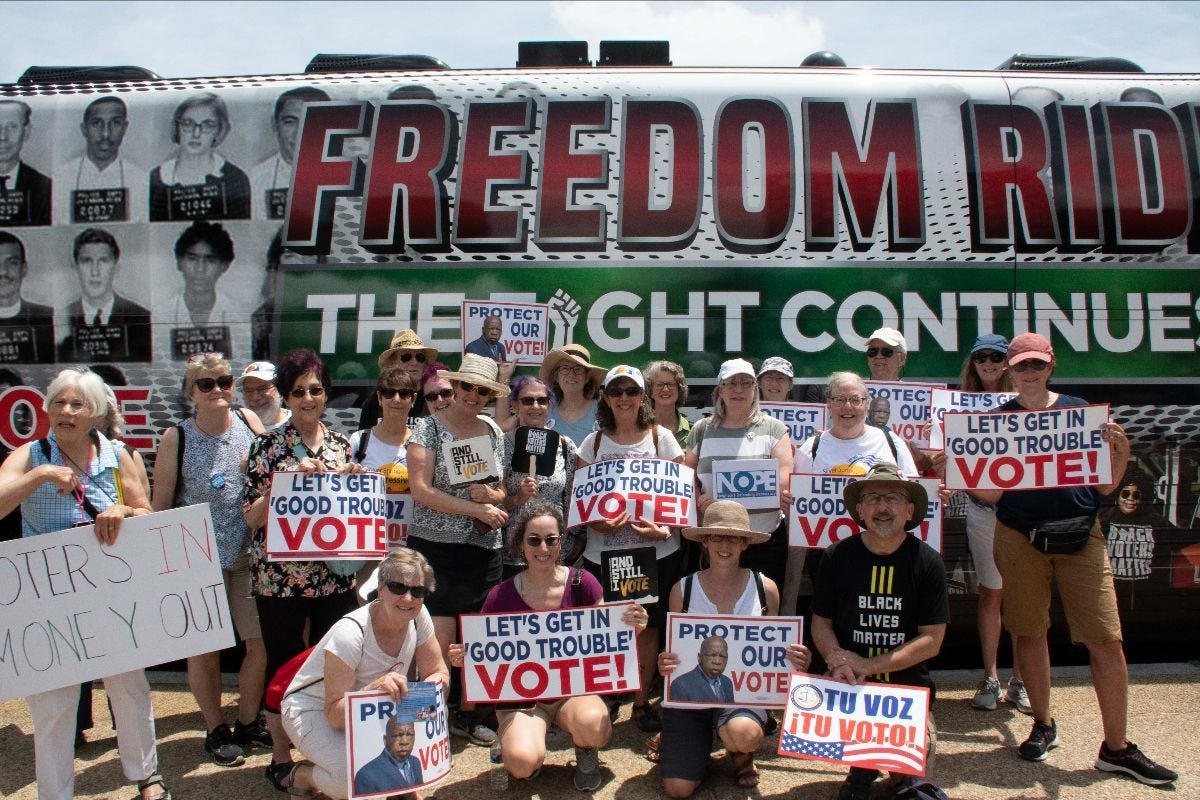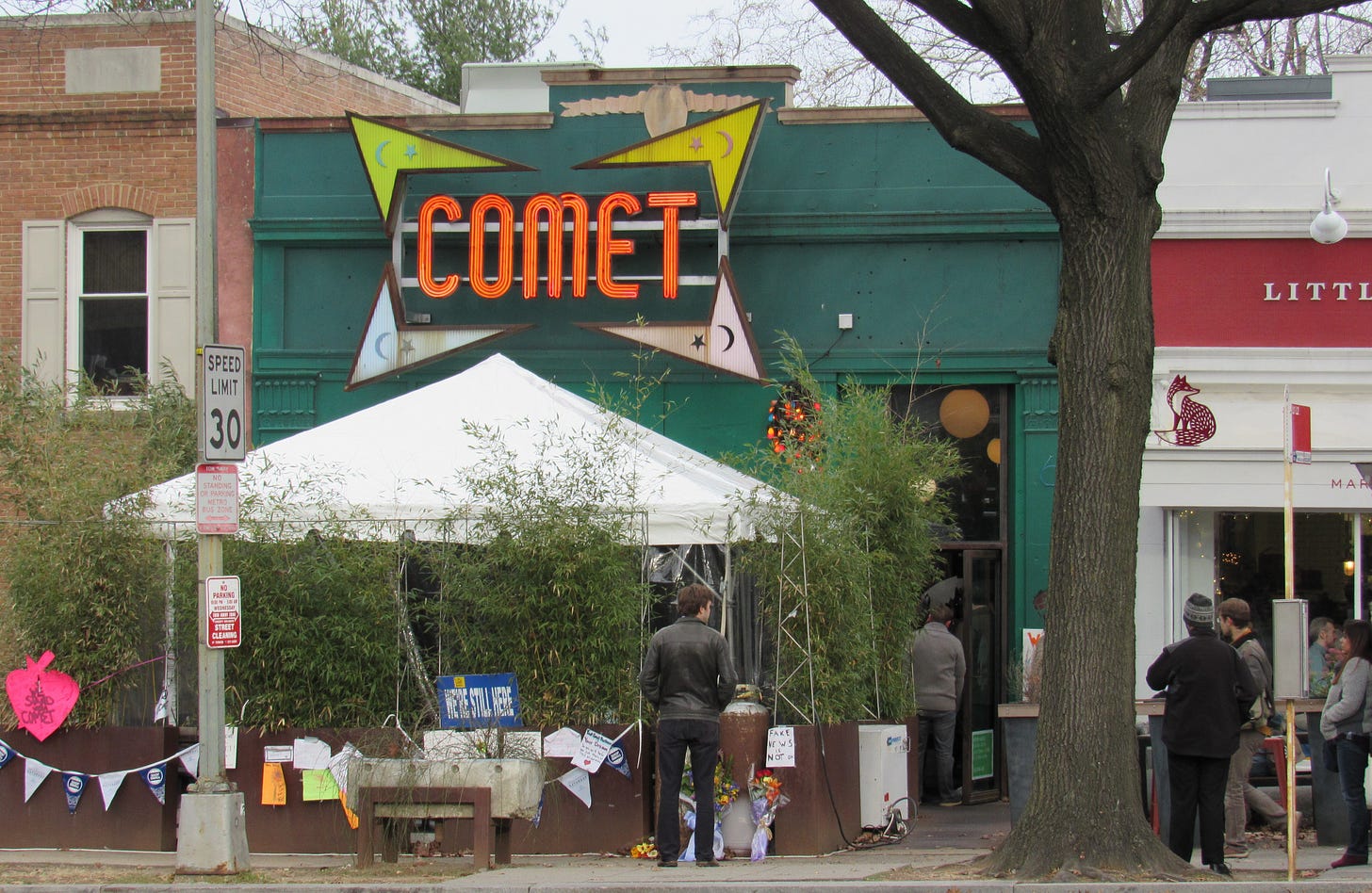Introducing NOPE
Third age women put sneakers on the ground to defend our democracy.

My first political canvass of the Trump era didn’t go well. In July 2018, as momentum built to flip the US House in November, I set off on my own from DC to Virginia to knock on doors for a Democratic candidate’s campaign. The temperature that day edged toward 100 degrees. I was sent to an area of flossy mini-mansions on sprawling grounds, and I struggled to walk between them in the heat. The tinkly fountains in their front yards reminded me of how badly I needed to pee.
When we’d knocked on just half our assigned doors, the volunteers I’d tagged along with announced pressing commitments elsewhere. Two kind women from DC, Betty Hawks and Dale Kaufman, came to my rescue and helped me finish the job. As I studied the address list, I could hear Betty talking. “Nope!” she kept saying. “Nope, nope.” What was that about, I wondered.
That’s how I found myself a few weeks later in a DC living room, being introduced to the women of NOPE (and one or two men). It was the beginning of a relationship that has endured.
An all-volunteer group with no office, bank account, or paid staff, NOPE helps Democrats in battleground states win elections through fundraising and voter outreach. Since 2017, NOPE has raised some $2.5 million for candidates and community organizing groups and has contacted tens of thousands of voters through door knocking, phone calls, and postcards.
But let me backtrack a moment, because NOPE has a pretty cool origin story. Actually two.
The Chevy Chase neighborhood of DC made headlines on December 4, 2016, when a North Carolina man charged into a local pizza parlor and fired his assault rifle, terrifying a roomful of pizza-munching families. For months, Trumpist conspiracy theorists had been insisting that Hillary Clinton ran a child sex-trafficking ring out of the restaurant, Comet Ping Pong. That fake news, a precursor to the QAnon movement, had now spawned violence. As neighbors rallied around Comet, a small group came together as NOPE: Neighbors Organizing for Power and Equality.
Meanwhile, the neighborhood had a new resident: Vice President–elect Pence, who parked his family in Chevy Chase to await the move to the VP’s mansion. To welcome the noted homophobe, his new neighbors put up pride flags. Joanna Pratt and others ordered the rainbow flags – 300 soon sprouted in nearby yards – and collected names and emails of people eager to help resist Trump. By February, a dozen or so women were meeting regularly around someone’s dining room table.
“Initially, everyone was going to march, march, march,” recalls Debra Fried Levin, who with Joanna Pratt led the early NOPE. “And I said, we can march all we want. Unless we change the policy makers, we’re getting nowhere. We should be doing campaigns. And what campaigns need most is canvassers and money.” The women first trained their sights on neighboring Virginia, which had a statehouse election coming up. With the help of activist groups, Virginia Democrats came within one seat of flipping the House of Delegates from red to blue in November 2017.
The next year offered a bigger prize: the 2018 midterms, with the opportunity to flip the US House. “Trump was the motivator to get people to do stuff they hadn’t done before,” Debra notes. “People were learning how to knock doors and raise money and give money.” NOPE grew, becoming part of a blue wave that rolled across the nation that November.
By January 2020 over 100 people were coming to meetings. We could no longer fit in a house. And then Covid hit. The pandemic was a game-changer for NOPE: it forced us onto Zoom, which vastly enlarged our reach. Our virtual meetings can now top 200. The NOPE Weekly Update, which I edit, goes out to 2,400 people, mostly in DC and its suburbs but with a sizable minority scattered across the country. With this wider outreach and the fervor around the November election, we raised $1.2 million for candidates and organizing groups in 2020.
NOPE’s data-driven targeting team selects high-stakes races in swing states where our input can make a difference. We don’t work for lost causes – good candidates who have little chance to win – or for candidates who are sure to win. Instead we focus on tight races, where every dollar raised or door knocked can influence the outcome. Our voter contact team trains and organizes our members to canvass in Virginia and the nearby battleground states of Pennsylvania and North Carolina. And in 2020, when the pandemic curtailed in-person door knocking, we hit the phones.

In addition to helping campaigns directly, NOPE supports community organizing groups that register and turn out voters for races up and down the ballot. We began in 2019 with Stacey Abrams’s Fair Fight Action. In 2021 we worked with six groups in six battleground states that have critical Senate races in 2022, raising over $50,000 for each group:
Black Voters Matter (Georgia)
BLOC (Wisconsin)
Carolina Federation (North Carolina)
LUCHA (Arizona)
Make the Road Nevada
One Pennsylvania
These groups work mainly in communities of color. NOPE’s support helps them hire local canvassers who can connect with their neighbors in ways that we – obvious outsiders from an out-of-state, predominantly white and privileged group – could not. Each group we support has a solid track record and passes a rigorous vetting process.
Investing in grassroots groups has advantages over funding candidates. When a candidate’s campaign is over, it’s over, and the money is gone. But organizing groups play the long game. They work year after year, building political strength in Democratic-leaning communities. In Georgia, Stacey Abrams and others began organizing over a decade ago to transform politics in their deep-red state. We saw the results in November 2020, when Georgia flipped to Biden, and in January 2021, when the state sent Raphael Warnock and Jon Ossoff to the US Senate, handing Democrats the majority. But the grassroots organizing model takes time. Holding our majority in the midterms won’t be easy. Indeed, 2022 is going to be a very tough year.
So where’s the Democratic Party in all this? Good question. “The party is so removed,” Debra laments. “Their emphasis is on media, social media, polling. The money that goes into local and state committees is a pittance compared to what you need for a robust ground game. And so you have these community groups stepping up, saying these are our people, this is our community, things have to change. They’re invested in ways the party is not.”
NOPE doesn’t handle the cash we raise or take anything out. We direct donations rather than collect donations, advising our members on where their dollars can have the most impact. We work through the ActBlue fundraising platform, where we create links to our chosen candidates and groups, so 100 percent of each donation goes to the targeted recipients. For example, we’re currently raising funds for Sen. Warnock’s reelection in 2022. Members’ giving is purely voluntary – some do and some don’t – and information about individual donations is never shared with the group. We do receive a summary of how much we’ve collectively raised and for whom, and our leadership team uses this to track our impact and hone our strategy.
Candidates and grassroots leaders regularly join our meetings by video chat to discuss the political situation in their states. On February 7, we’re excited that our speaker will be Sen. Raphael Warnock of Georgia. The meeting is open to all and I hope you’ll join me: sign up here to receive a Zoom invitation.

Since last year, GOP-controlled legislatures across the country have passed new laws to restrict voting access and bring elections under partisan control. In response, we’ve expanded NOPE’s focus to include voter protection and voting rights. This means working to ensure that people are registered to vote, that voting is accessible, and that votes are counted and certified fairly. Among other things, our volunteers will staff hotlines that help voters return mail-in ballots and fix problems with rejected ballots. Our new name reflects this emphasis: NOPE: Neighbors Defending Democracy.
NOPE isn’t the only group of its kind. There are others out there, flying under the radar, deeply immersed in electoral politics yet independent of party control. It’s a fair guess that in many of them, third age women – with decades of experience, a versatile skill set, and deep commitment to our democracy – play leading roles.



I also loved this entry and will, now that I understand the history of NOPE, be signing up.
I loved this entry, Cathy, and I have signed up for the Feb. 7 meeting.